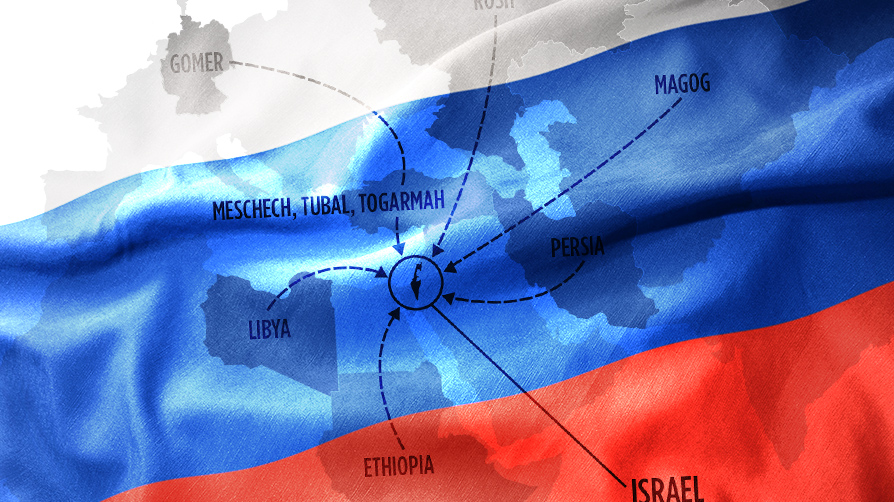From the World Wars...to the Cold War...to the current ongoing war in Ukraine, the name “Russia” has increasingly appeared in headline after headline, often at the center of so many of our most troubling global news stories.
These are just a few I’ve clipped while scrolling my newsfeed recently:
- Russia Warns of Chernobyl Repeat in Ukraine Due to NATO Aid
- Russia-Ukraine war: Hungary signs new energy deals with Russia; UN tally of Ukraine civilian deaths approaches 8,500
- Russian and Chinese defense officials agree to strengthen defense ties
But I’m sure you can think of many more you’ve seen blaring across your TV screen or social media—threats, wars, spying, alliances, trade deals...the list could go on and on.
According to biblical prophecy, Russia will amass a coalition to invade Israel in the End Times. Find out who will be involved, when it will happen, and what it means for us today.
• Where to Find Russia in the Bible
• Who Will Join Russia’s Prophesied Alliance
• Why the Russian Alliance Cannot Yet Invade Israel
• When the Russian Alliance Will Invade Israel
• How Israel Will Survive the Invasion
• What the Russia Prophecy Means for Us Today
Could this be a mere coincidence? Evidence of nothing more than the typical international machinations and power plays countries have engaged in since the beginning of time?
Perhaps.
But the more I study God’s Word, the more convinced I become that these headlines are pieces of a prophetic puzzle falling into place as our world edges closer to the Last Days.
Here’s what you need to know....
- Russia is identified as Rosh in Ezekiel's prophecy, 2,500 years ago, predicting an attack on Israel in the future.
- Russia's role in the prophecy is significant, as it leads an alliance of nations against Israel.
- The alliance includes nations such as the former "stan" countries, Turkey, Iran, Sudan, Libya, and possibly Germany.
- Before Russia attacks, Israel must be present, prosperous, and peaceful in its own land.
- Despite the seemingly overwhelming force of the Russian-led alliance, God will protect Israel.
- The prophecy serves as a reminder of God's power and protection, even in situations that seem hopeless and insurmountable.
In recent years, Russian President Vladimir Putin has aggressively pursued reunification of the Soviet bloc. He has annexed Crimea, crept into the Republic of Georgia, and invaded Ukraine. Not only is he provoking the people of Eurasia, but his strong-armed policies are also causing concern around the world. According to a Gallup poll, the public has consistently ranked Russia as the United States’ second greatest enemy since 2015.1 Newsfeeds swirl with questions about his intentions, but perhaps we should ask ourselves this question: What does the Bible say about modern Russia?

Where to Find Russia in the Bible
Approximately 2,500 years ago, Ezekiel predicted specific events that will occur in Russia’s future. He begins Ezekiel 38 with a long list of nations that will attack Israel. None of these nations are called Russia; that name is not found anywhere in the Bible. However, the reference to Rosh in verse 2 is a shortened version of the word Russia. This can be determined linguistically and geographically. The Bible describes Rosh as being far to the north of Israel, which was the reference point for Ezekiel’s original audience.
Both Ezekiel and Daniel describe Israel’s End-Times aggressor as descending from the north. Daniel used the phrase “king of the North” to describe the commander of the alliance (Daniel 11:5-35). Ezekiel’s prophecy lends support to Daniel’s, indicating the invading armies will arrive in Israel “from the far north” (Ezekiel 38:6, 15). Russia is the only modern nation to match this description.
Organized by chapter, this panorama of biblical prophecy will give you a bird’s-eye view of God’s prophetic timeline.
One name on Ezekiel’s list, Gog, is the name of a national leader. We find this in Ezekiel 38:1-2, “Now the word of the Lord came to me, saying, ‘Son of man, set your face against Gog, of the land of Magog, the prince of Rosh, Meshech, and Tubal.’” So, Gog is the prince of Rosh, or we would say the leader of Russia. Some scholars believe Gog is a title rather than a personal name.

The names and places Ezekiel describes are foreign to us today, but a closer look at Scripture and history will help us translate these into modern terms.

Who Will Join Russia's Prophesied Alliance
Magog.
Gog is from the land of Magog (verse 2). Magog was also the name of one of Noah’s grandsons (Genesis 10:2; 1 Chronicles 1:5), and many scholars believe his descendants settled around the Black and Caspian Seas on Russia’s southern border. In The Jeremiah Study Bible, I identify this region as the former “-stan” countries (Kazakhstan, Kyrgyzstan, Uzbekistan, Turkmenistan, Tajikistan, and perhaps Afghanistan), all former constituents of the Soviet Union. What unites the sixty million residents of this region today is their religion: Islam.
Meshech and Tubal.
These were also grandsons of Noah (Genesis 10:2). Their descendants established cities or territories bearing their names. C. I. Scofield identifies Meshech as “Moscow” and Tubal as “Tobolsk.”2 Other scholars identify these as territories in modern Turkey.
Persia.
Persia is mentioned in Ezekiel 38:5 and about 35 more times in Scripture. In 1935, Persia changed its name to Iran. Then in 1979, it became the Islamic Republic of Iran. Today, Russia is Iran’s strongest ally and Israel’s strongest enemy. This alliance will continue in the latter days.
Ethiopia.
Founded by another of Noah’s grandsons (Genesis 10:6), Ethiopia is one of two North African nations that will join the alliance (Ezekiel 38:5). Ancient Ethiopia represented the land south of Egypt. Today that region is the modern country of Sudan, another declared enemy of Israel.
Libya.
Occupying land to the west of Egypt, Libya is the only nation on Ezekiel’s list that retains its ancient name today. It was founded by Put, another of Noah’s grandsons (Genesis 10:6). Today, Libya’s official religion is Islam. It maintains strong ties with Russia, and there is evidence that Libya is seeking to purchase military armaments from Russia.3
Gomer.
According to Genesis 10:2-3, Gomer was one of Noah’s grandsons. Some scholars place the territory in modern Germany because of the similarity of their names. Nobody needs to remind the world of Germany’s history with the Jewish people in World War II. If Germany allies with Russia against Israel, it would not be the first time anti-Semitism has played a part in her history.
Togarmah.
Moving down Noah’s family tree, Togarmah was one of his great-grandsons (Genesis 10:3). Ezekiel places this tribe in “the far North” (Ezekiel 38:6). Some believe Togarmah could be the foundation of modern-day Turkey.
Regardless of their exact modern identities, these nations were identified as parts of an alliance led by Gog, the leader, to come against Israel. Russia and Turkey will lead from the north. Iran will join from the east. Sudan and Libya will press in from the south and possibly Germany from the west. To darken the picture for Israel, these likely represent the chief allies in the invasion. In Ezekiel 38:9, the prophet added that the nation will have “many peoples'' on its side.

Why the Russian Alliance Cannot Yet Invade Israel
Before Russia attacks Israel, three requirements will have to be met. Understanding these requirements helps us anticipate the timing of the attack.
1. Israel must be present in her land.
For over two thousand years, the Jewish people were scattered all over the world, living among Gentiles, because there was not a Jewish nation. In 1948 that changed. The nation of Israel was reborn, and many Jews returned to their homeland. So the first prerequisite for the invasion of Russia has already been fulfilled. Israel occupies her land.
2. Israel must not only be present in her land; she must be prosperous in her land.
Ezekiel prophesied that when the Jewish people return to their homeland, God will bless them beyond anything they have known in their history. Ezekiel 36:11 describes Israel’s wealth this way, “I will multiply upon you man and beast; and they shall increase and bear young; I will make you inhabited as in former times, and do better for you than at your beginnings.”
The modern fulfillment of this prophecy is evident in Israel’s thriving economy, which has been ranked as the world’s third most innovative, behind Finland and Switzerland and just ahead of Japan and the United States.4 Modern Israel is a center of innovation and entrepreneurship, which means the second prerequisite to Russia’s invasion has been met.
3. Israel must be at peace in her land.
If you visit Israel today, you will see people with guns slung over their shoulders everywhere you go. They are always on alert because they know they could be attacked by their neighbors at any moment. Ezekiel 38:11 describes a markedly different Israel, “[Gog] will go up against a land of unwalled villages; [Gog] will go to a peaceful people, who dwell safely, all of them dwelling without walls, having neither bars nor gates.” When Russia attacks Israel, the nation will be disarmed! That is difficult to imagine.

When the Russian Alliance Will Invade Israel
This radical shift in Israel, when she will lower her defenses, will occur at the beginning of the Tribulation or just before it. At the time of the Rapture, the Antichrist will make a seven-year deal with Israel in which he will promise to protect the nation. Israel will become dependent upon the Antichrist, disarm her army, and devote all her energy to increasing her wealth. The nation will be defenseless against the northern coalition.
We do not know when Israel will make this pact with the Antichrist because we do not know when the Rapture will occur. Matthew 24:36 makes that clear. However, we can be certain this army will come against Israel when the nation is present, prosperous, and peaceful in her land. The north’s invasion of Israel is not going to happen in the immediate future, but perhaps sooner than we think.

How Israel Will Survive the Invasion
From a human perspective, there is no way Israel will overcome this assault. The nation’s only hope will be God’s intervention, and Russia will be blind to this prospect. Ezekiel describes the Lord’s response to Russia’s invasion this way: “‘It will come to pass at the same time, when Gog comes against the land of Israel,’ says the Lord God, ‘that My fury will show in My face. For in My jealousy and in the fire of My wrath I have spoken: “Surely in that day there shall be a great earthquake in the land of Israel”’” (Ezekiel 38:18-19).
Later in the chapter, there is a description of massive casualties among the northern coalition and a series of natural disasters. God will use the evil tendencies of the allied nations—their greed, their hatred, their bloodlust—to goad them into attacking Israel so that He can execute His judgment against them for their long history of opposition to the Jewish people. God’s judgment will rain down in a series of disasters even more spectacular and catastrophic than the plagues of ancient Egypt.

What the Russia Prophecy Means for Us Today
God does not reveal the future to us, but the Bible informs us of these signs so that we will never fear impossible odds. In fact, the impossible is not possible when God is on our side. Jesus assures us with these words, “With God all things are possible” (Matthew 19:26). In Paul’s letter to the Ephesians, he writes that God “is able to do exceedingly abundantly above all that we ask or think, according to the power that works in us” (Ephesians 3:20). Israel’s impossible odds are no obstacle for her incomprehensible God. Her invisible Ally is impossible to overcome.
In our culture, God’s people often feel powerless. They throw up their hands and refuse to resist the onslaught of evil. That is not the answer. We should all be as involved as possible, pursuing that which is right. When all of that is finished, and we have done our best, God is still present with all His power, with all His majesty, and with all His ability.
Prophecies like this one about the future of Russia and Israel remind us we have a great and awesome God, and nothing is beyond His power. Even when it looks like there is no hope, God can come in and change everything.
Sources:
1Gallup, “Russia,” https://news.gallup.com/poll/1642/russia.aspx, accessed on February 6, 2019.
2C. I. Scofield, The Scofield Study Bible (New York: Oxford University Press, 1909), 883.
3Mustafa Fetouri, “Libya Looks to Russia for Arms,” Al-Monitor, April 20, 2015, http://www.al-monitor.com/pulse/originals/2015/04/libya-us-uk-france-russia-uneast-west-armament-deal-morocco.html.
4Paul Muggeridge, “These Are the Most Innovative Countries in the World,” World Economic Forum; July 9, 2015; https://www.weforum.org/agenda/2015/07/these-are-the-most-innovative-countries-in-the-world.
Please pray and give today as God leads you. Thank you!
